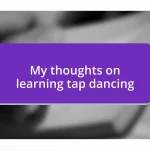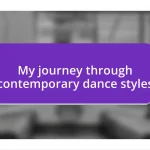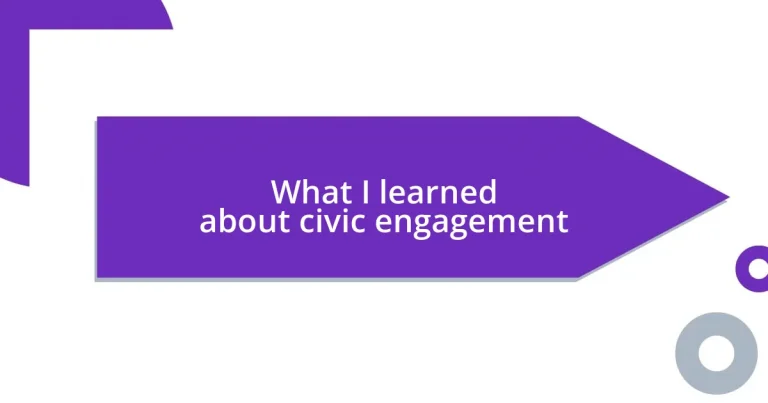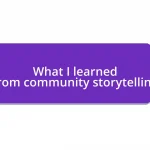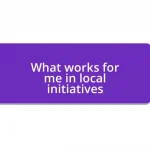Key takeaways:
- Civic engagement involves active participation in community life, influencing public decisions, and recognizing diverse forms of involvement.
- Embracing civic responsibility fosters informed decision-making, strengthens community bonds, and can lead to significant societal changes.
- Overcoming barriers to engagement, such as feelings of intimidation and logistical challenges, can be achieved through small, consistent actions and creating inclusive environments.
- Successful civic initiatives, like mentorship programs and community clean-ups, highlight the transformative power of collective action and personal stories.
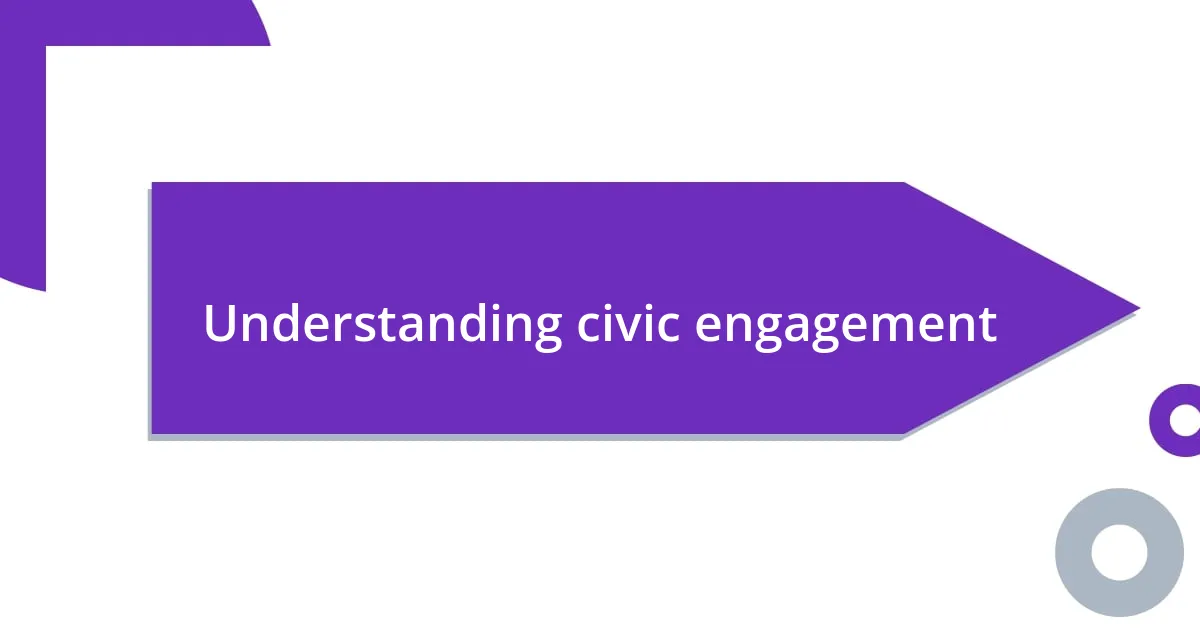
Understanding civic engagement
Civic engagement is essentially about participating in the life of your community and influencing public decisions. I remember my first community meeting; the energy in the room was palpable as people came together, eager to voice their thoughts and concerns. What struck me was how even a single voice could spark a discussion that might lead to real change.
Everyone has a role to play in civic engagement, whether it’s through voting, volunteering, or simply staying informed. I often ponder, how does my participation make a difference? Each time I share my perspective or take part in a local initiative, I feel a part of something bigger than myself, contributing to a collective effort that shapes our shared future.
Understanding civic engagement also means recognizing its diverse forms. For instance, I’ve seen people advocate for change through art or social media, reaching audiences in ways traditional methods can’t. Isn’t it fascinating how different mediums can mobilize communities? Each method has its significance, reminding me that engagement is not one-size-fits-all; it’s as varied as the people who practice it.
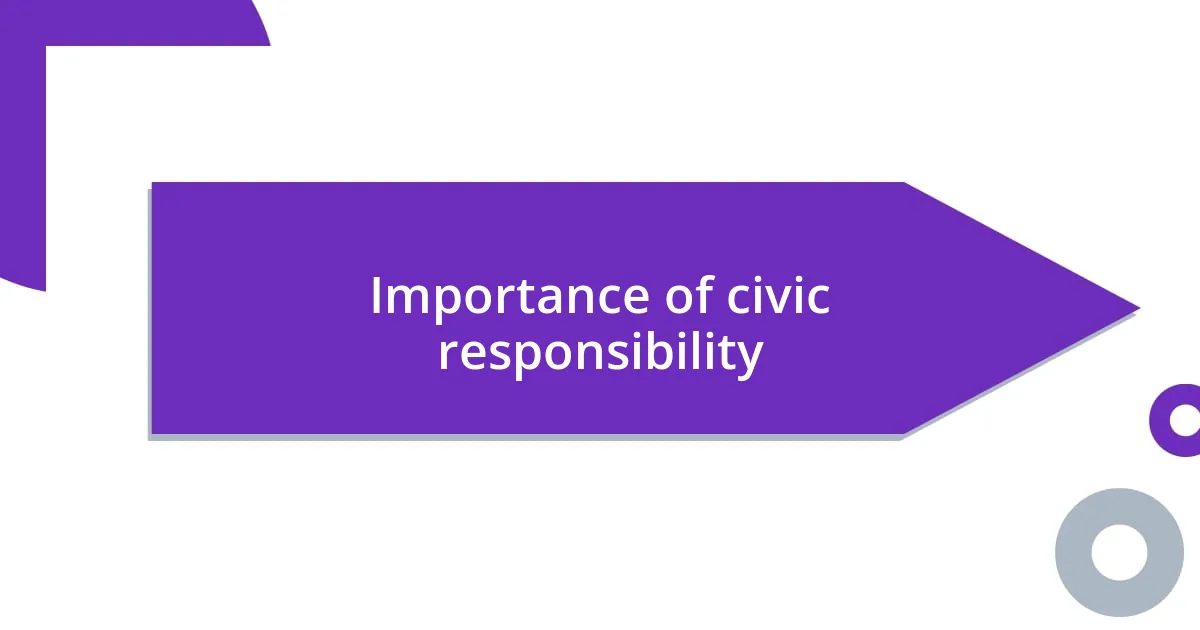
Importance of civic responsibility
Civic responsibility is at the heart of a thriving democracy. I recall a moment during a local election campaign when I watched my neighbors rally together to support a candidate they believed in. That shared passion not only empowered the candidate but also strengthened our community bonds, reminding me that active participation fosters a sense of belonging and ownership in our shared environment.
When individuals embrace their civic responsibilities, it leads to informed decision-making and community growth. I’ve often observed how volunteering for local causes not only benefits those in need but also enriches the volunteers’ lives. I felt a profound sense of fulfillment the first time I organized a neighborhood clean-up; seeing the tangible results of our collective effort ignited my passion for ongoing community service.
The impact of civic responsibility extends beyond the individual level, influencing broader societal change. Consider how grassroots movements often start with just a handful of motivated individuals developing a cause they deeply care about. This was evident to me during a recent advocacy workshop I attended. The speaker shared how one person’s idea grew into a nationwide initiative, demonstrating that every small act of civic engagement can have far-reaching consequences.
| Aspect | Impact |
|---|---|
| Community Engagement | Strengthens social ties and fosters collaboration |
| Informed Decision-Making | Leads to better governance and policy-making |
| Empowerment | Encourages individuals to take charge of their environment |
| Long-term Change | Small actions can culminate in significant societal shifts |
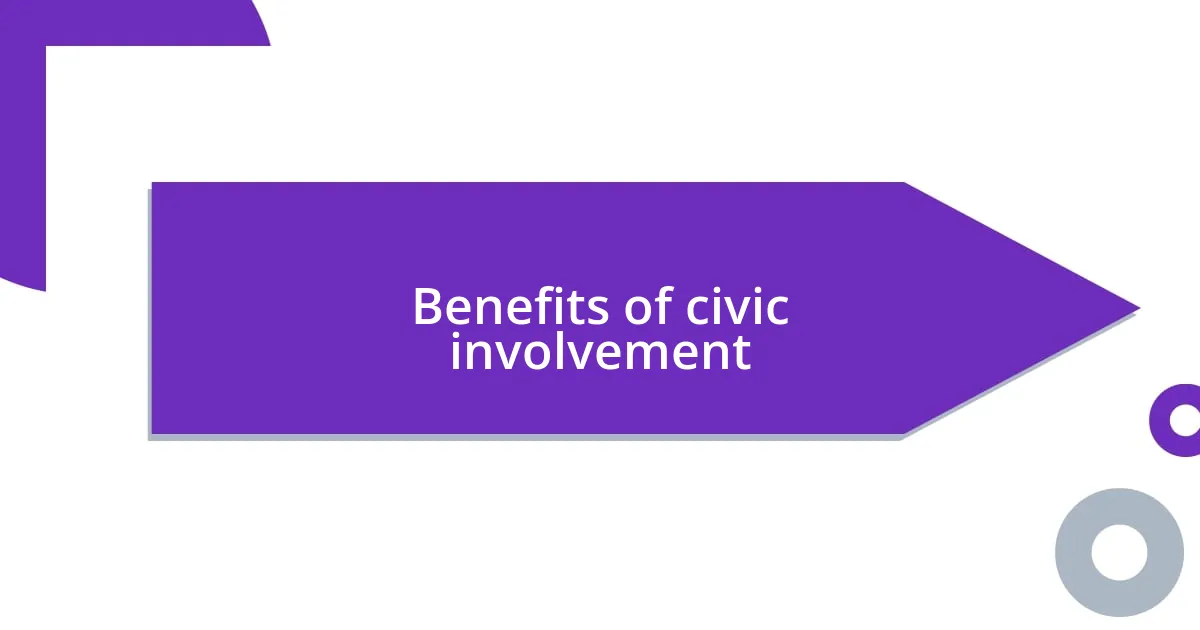
Benefits of civic involvement
Civic involvement opens doors to numerous personal and communal benefits. From my own experience, attending town hall meetings has not only deepened my understanding of local governance but has also created opportunities to meet incredible individuals who share my passion for community improvement. Each conversation ignites a sense of solidarity, and it’s uplifting to realize that navigating challenges together can lead to transformative outcomes for everyone involved.
Here’s a quick list of some tangible benefits I’ve witnessed firsthand:
– Stronger Community Bonds: Participating in events fosters relationships and connections that enrich our lives.
– Enhanced Problem Solving: Diverse viewpoints bring creative solutions to the table, which I’ve seen firsthand during brainstorming sessions.
– Empowerment of Marginalized Voices: Engagement offers a platform for those often overlooked, making their experiences and opinions matter.
– Personal Growth: I’ve learned skills—like leadership and organizing—that I never knew I could acquire outside of a classroom setting.
– Greater Civic Knowledge: The more I engage, the better I understand the systems that govern us, which helps me be a more informed and effective participant in my democracy.
These benefits truly embody the richness of civic involvement, reminding me that active participation is not only about giving back but also about personal evolution and community transformation.
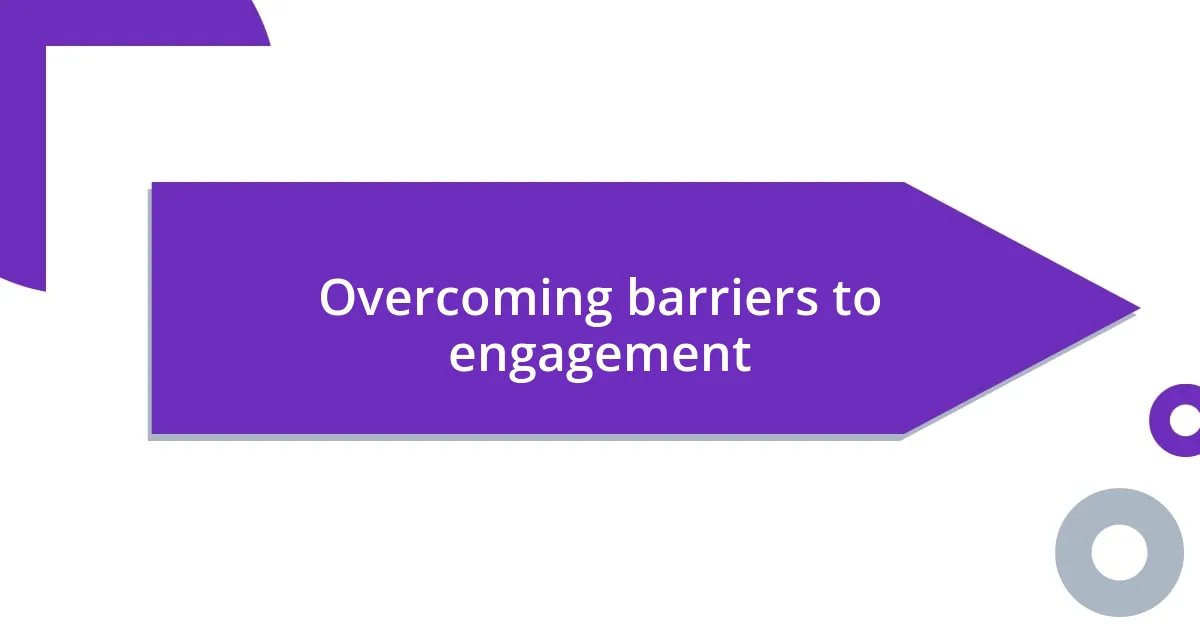
Overcoming barriers to engagement
One of the most pronounced barriers I’ve encountered in civic engagement is the feeling of overwhelm. Sometimes, simply stepping into a community meeting can feel intimidating, especially if you’re unsure of what to expect. I remember attending a city council meeting for the first time; the formal atmosphere made me question if my voice truly mattered. But what I learned that night is that everyone starts somewhere, and even the quietest voices can spark valuable conversations.
Logistical barriers can also hinder participation. I’ve had days where my schedule was so packed that squeezing in time for civic duties felt impossible. However, I discovered that even small actions—like signing a petition during lunch or making a quick call to my representative—can make a significant impact. This realization changed my approach and showed me that consistent, albeit small, engagement fuels the engine of civic involvement.
Moreover, it’s vital to address social barriers that hinder participation, particularly among marginalized communities. The first neighborhood resource fair I volunteered at opened my eyes to how many voices go unheard due to societal obstacles. Realizing the importance of creating welcoming environments ignited my passion for inclusivity. Have you ever thought about how your presence could be the nudge someone else needs to engage? It’s moments like these that remind me just how essential it is to lift one another up in our civic journeys.
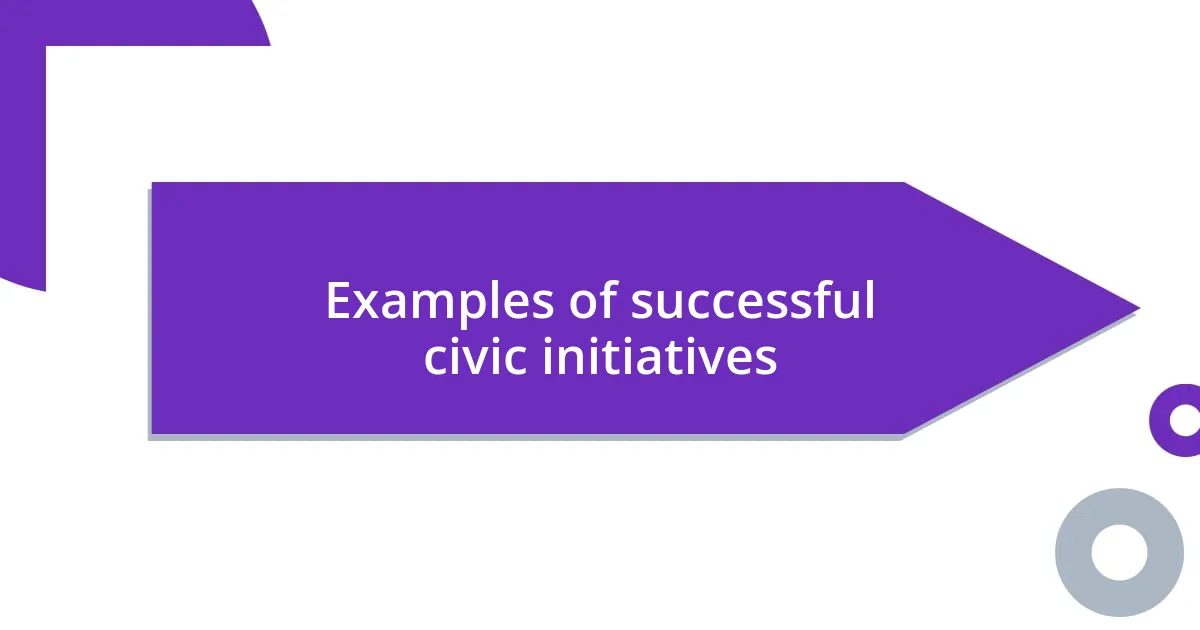
Examples of successful civic initiatives
Examples of successful civic initiatives
One standout example of a successful civic initiative is my local community’s “Clean Streets Program.” Each weekend, residents gather to clean up parks and neighborhoods. The first time I participated, I was amazed by how many people showed up—strangers transformed into friends, all united for a common purpose. I couldn’t help but feel a sense of pride as we filled bags with trash, knowing that our small actions would lead to a cleaner environment.
Another inspiring initiative I witnessed was a mentorship program aimed at supporting youth in underprivileged areas. When I first heard about it, I was skeptical about how much of a difference we could make. Yet, watching mentors and mentees bond over shared interests—sports, arts, and even academics—filled me with hope. I remember one young girl sharing how the program helped her believe in her potential. It’s a powerful reminder that investing time in others can change lives in ways we might not even realize.
Finally, the “Voices of the Community” initiative deeply resonated with me. This program encouraged residents to share personal stories and experiences during town hall meetings. Initially, I hesitated to speak up, thinking my story wasn’t significant enough. But when I finally shared my experiences, I was met with applause and support. It solidified my belief that everyone’s voice matters, and sometimes, those stories can inspire others to take action too. What initiatives have you seen in your community that stirred similar feelings within you?
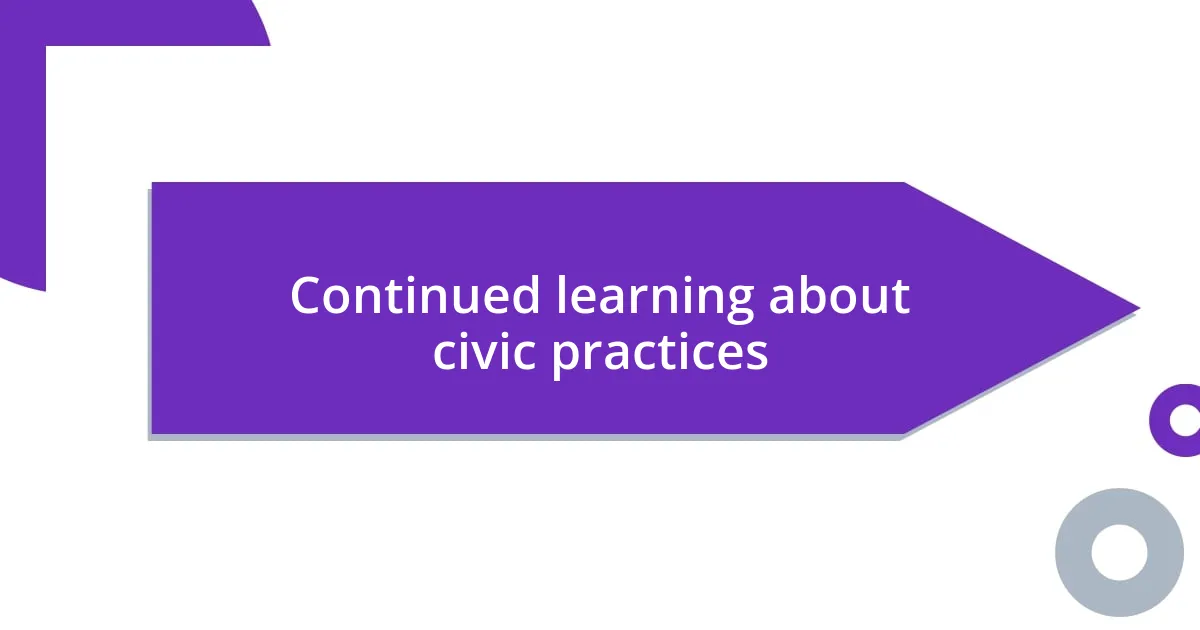
Continued learning about civic practices
Continued learning in civic practices is a journey that never truly ends. I remember my initial concept of civic engagement centered around attending meetings and voting. However, as I’ve delved deeper, I’ve come to appreciate that learning about local governance, community needs, and the impact of policies is just as crucial. I often ask myself—how can I contribute effectively if I don’t fully understand the landscape around me?
Participating in workshops and community discussions has significantly enriched my perspective. For instance, I once joined a session on public speaking tailored for community advocates. The nerves I felt while speaking in front of others completely faded once I recognized the shared goal of making our voices heard. Engaging with others allowed me to refine my thoughts and even hear different viewpoints, which often encouraged me to rethink my approaches. Have you ever experienced a moment that changed the way you view participation?
Moreover, I’ve found that informal learning opportunities, like conversations with activists and local leaders, are invaluable. One evening, I shared a meal with a friend who champions environmental issues. Listening to her experiences inspired me to explore the intersection between civic engagement and environmentalism in our community. These dialogues not only broaden my knowledge but also deepen my commitment to active participation. How often do you seize the chance to learn from those pursuing different civic paths? It’s these connections that fuel our collective growth.





